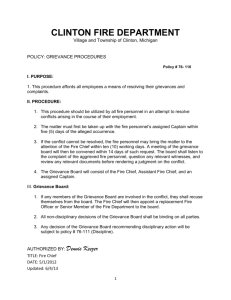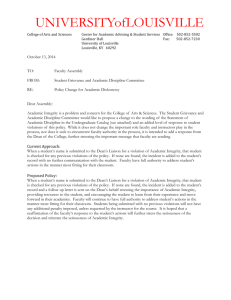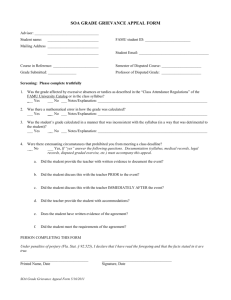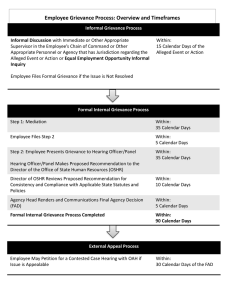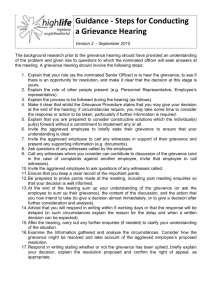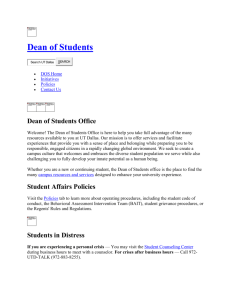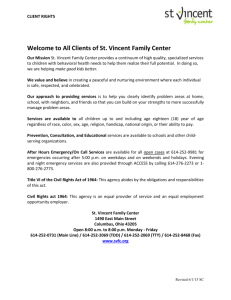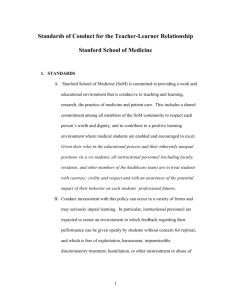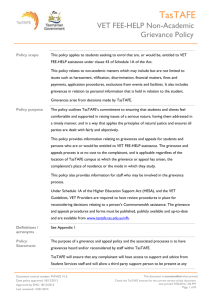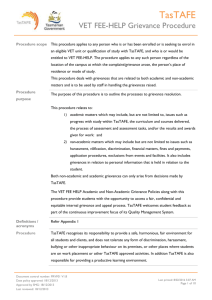Student Rights - Northwestern Connecticut Community College
advertisement
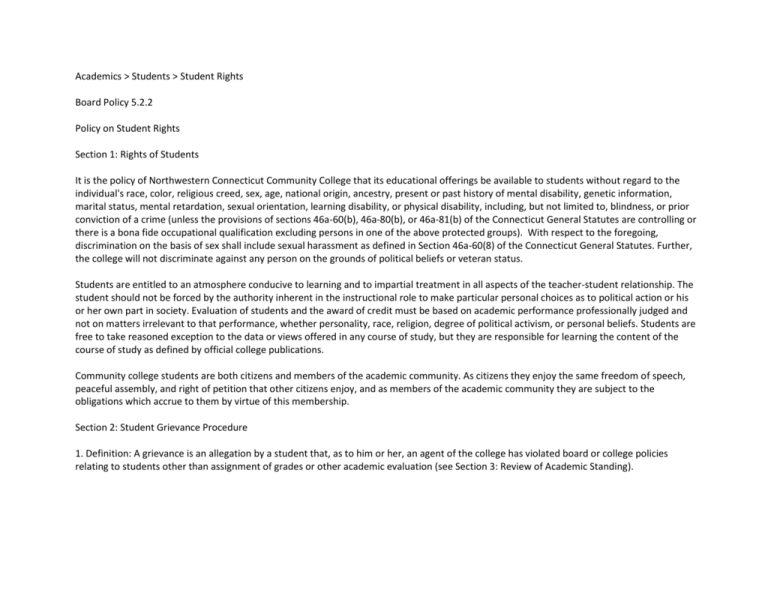
Academics > Students > Student Rights Board Policy 5.2.2 Policy on Student Rights Section 1: Rights of Students It is the policy of Northwestern Connecticut Community College that its educational offerings be available to students without regard to the individual's race, color, religious creed, sex, age, national origin, ancestry, present or past history of mental disability, genetic information, marital status, mental retardation, sexual orientation, learning disability, or physical disability, including, but not limited to, blindness, or prior conviction of a crime (unless the provisions of sections 46a-60(b), 46a-80(b), or 46a-81(b) of the Connecticut General Statutes are controlling or there is a bona fide occupational qualification excluding persons in one of the above protected groups). With respect to the foregoing, discrimination on the basis of sex shall include sexual harassment as defined in Section 46a-60(8) of the Connecticut General Statutes. Further, the college will not discriminate against any person on the grounds of political beliefs or veteran status. Students are entitled to an atmosphere conducive to learning and to impartial treatment in all aspects of the teacher-student relationship. The student should not be forced by the authority inherent in the instructional role to make particular personal choices as to political action or his or her own part in society. Evaluation of students and the award of credit must be based on academic performance professionally judged and not on matters irrelevant to that performance, whether personality, race, religion, degree of political activism, or personal beliefs. Students are free to take reasoned exception to the data or views offered in any course of study, but they are responsible for learning the content of the course of study as defined by official college publications. Community college students are both citizens and members of the academic community. As citizens they enjoy the same freedom of speech, peaceful assembly, and right of petition that other citizens enjoy, and as members of the academic community they are subject to the obligations which accrue to them by virtue of this membership. Section 2: Student Grievance Procedure 1. Definition: A grievance is an allegation by a student that, as to him or her, an agent of the college has violated board or college policies relating to students other than assignment of grades or other academic evaluation (see Section 3: Review of Academic Standing). 2. How to file a grievance: A grievance is to be submitted in writing to Dr. Patricia Bouffard, Dean of Academic and Student Affairs, FH 103, 860738-6319, within thirty days of the date the grievant knew or reasonably should have known of the alleged violation. The written grievance shall specify the right claimed to have been violated and state briefly the underlying facts. 3. Procedure for grievance resolution: The Dean shall investigate the grievance and, within thirty days from the time the grievance was submitted recommend to the president a disposition of the grievance, except as provided hereinafter: a. In the course of each investigation, the Dean shall consult with the dean responsible for the area of college operations in which the grievance arose. b. In the case of a grievance alleging discrimination based on race, color, religious creed, sex, age, national origin, ancestry, present or past history of mental disorder, marital status, mental retardation or physical disability, prior conviction of a crime, political beliefs, veteran status, or sexual preference, the Dean shall consult with the Affirmative Action Officer. c. In the case of a grievance against a dean, the grievance shall be filed with the president. The president may accept or reject the recommendation, or direct such further investigation as he or she deems appropriate. The president shall notify the student of the final disposition of the grievance within fifteen days of receiving the recommendation, except for good cause or as provided in 4. below. 4. Advisory Committee: The president may establish an advisory committee of students and staff which may be charged with the responsibility of making recommendations at either the level of the deans or the president. The president may appoint and remove members of the committee. If an advisory committee is appointed, the president shall establish a reasonable time frame within which the committee must make recommendations. Section 3: Review of Academic Standing A student may seek review of the assignment of a grade or other decision affecting academic status in accordance with the following procedure: The Academic Appeal process provides a way for students to appeal academic disputes with an instructor. The steps of the appeal process must be followed in order and in a timely manner. The details concerning the timeline and process are described below. Timing of Appeals Academic Appeals by a student must be initiated no later than fifteen calendar days after of the posting of the student's final grade. The student can obtain the Appeal Packet from the office of the Dean of Academic and Student Affairs. Each successive step in the appeals process must be initiated within four calendar weeks of completion of the prior step. Confidentiality Under the Family Educational Rights & Privacy Act of 1974, as amended, a student’s education record may not be disclosed without the written permission of the student. The materials from this process will not be disclosed and will remain in the possession of the office of the Dean of Academic and Student Affairs. At any time a student may seek the assistance of others in preparing a request for review of academic standing. However, consistent with the student’s responsibility and the developmental mission of the College, in all meetings and communications with faculty and others pursuant to this Policy, a student may neither be accompanied by an advisor, advocate or attorney nor will the College communicate with an advisor, advocate or attorney for the student.

